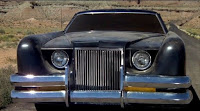So, there was Something Important I wanted to talk about this week. A style thing I’ve seen a few People do. It’s not inherently right or Wrong, but I thought it was worth mentioning so it’d (hopefully) be in your mind if you happened to encounter it. Or thought about doing it.
But first… a story.
A few months ago I started reading a sci-fi book that kept talking about Enemy Androids. And some people were Cyborgs. Who reported to their Cyborg Leader. Who operated mostly out of his Headquarters. So this one Cyborg was sent on a secret mission to spy on the Enemy Androids. Along the way he met a Woman who seemed like a love interest, but in the end she turned out to be one of the Enemy Androids.
Oh, and they fought an Android Dinosaur, too. Yeah, I’m not exactly sure how that works, either. Another writer who didn’t understand the terms they were using.
Or did they?
Anyway, I’m simplifying the story a lot here. Don’t judge the book on that. But feel free to judge it on that other thing…
There are certain things we always capitalize—proper nouns, names, or the first letter in a sentence. There’s a reason for this. It’s a form of emphasis. It helps us distinguish the special, specific things from the everyday ones.
 Take, for example, the classic horror movie The Car. It’s not about any old random vehicle—the Car is a very specific automobile. And it has to be, not just because it’s pure evil on wheels, but also because there are lots of cars in this movie. If I was reading the script, or a review, or maybe the novelization (was there one? We’ll say yes for this example…), the reader needs to know the difference between the Car and some of the random cars that appear. The capitals mark it as the definite article.
Take, for example, the classic horror movie The Car. It’s not about any old random vehicle—the Car is a very specific automobile. And it has to be, not just because it’s pure evil on wheels, but also because there are lots of cars in this movie. If I was reading the script, or a review, or maybe the novelization (was there one? We’ll say yes for this example…), the reader needs to know the difference between the Car and some of the random cars that appear. The capitals mark it as the definite article. The catch is that only the Car is special. We don’t also have a guy riding a Bike, the police aren’t checking on all of this in Squad Cars, and the many bodies aren’t taken away in Ambulances. There’s no reason for these other vehicles to be capitalized, because there’s nothing special about them.
I see writers do this sometimes. Might be worth noting that it’s almost always either folks who are just writing down their first story, or people writing genre. Genre attracts capitals for some reason (as in my opening example).
In the latter case, if I had to guess, I think genre writers lean on capitals because we think it makes things special. Capitalization does bring a certain cachet with it. There are lots of empires throughout history, but if I mention the Empire, most of you are going to think of stormtroopers and battle stations. Sure we’ve seen cyborgs before in tons of stuff, but I’m writing about Cyborgs—capital C. They’re so much more interesting. Same with those Enemy Androids. They’re totes better than those boring old enemy androids everyone else has written about.
But… remember the catch? In the same way the Car is different from all other cars, if I’m going to have Cyborgs, there needs to be a reason they’ve got that capital. They have to earn it somehow. I can’t have regular old cyborgs with a capital C for the same reason I don’t capitalize every car—there’s nothing special about them.
Y’see, Timmy, using capitals like this is a lot like using exclamation points, or any sort of gimmick. The more I use it, the less effective it becomes. It doesn’t take long for my readers to notice what I’m doing. And the moment they notice—the moment they start auditing the story over experiencing it—is the moment I’ve lost them. That’s when the gimmick becomes a liability.
And liabilities get my manuscript dropped onto that pile on the left.
Next time, I’d like to talk about a series of traps we all fall into at one point or another.
Until then, go write.



